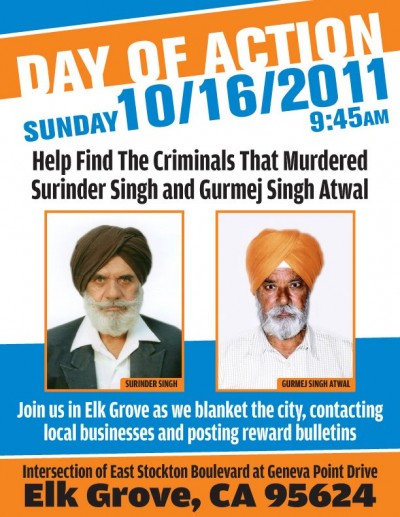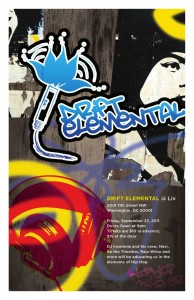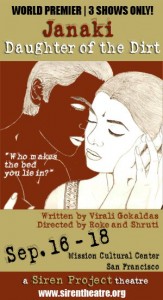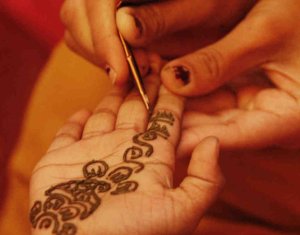If you go to Zuccotti Park at 4 a.m., you will see them: a contingent from Occupy Wall Street’s People of Color (POC) working group, standing with others who are banding together to protect protestors from a city effort to clean up the space—widely viewed as a coded way to shut down OWS. Continue reading
Category Archives: Identity
I Want the World To Know
Today is National Coming Out Day and when I used to live in L.A., I’d join the annual parade of South Asians walking down Pioneer Blvd. chanting, “We ‘re here! We’re queer! We’re on Pioneer!” As you can imagine, the South Asian community is not quite so accepting of ‘The Gays” in the community. I supported as an ally because I wanted to be a supporting Desi face even when their family members couldn’t be.
But sometimes, coming out to your family may not be right for everyone. I came across a touching story from Nancy Haque titled Coming Out About Not Being Out from the Western States Center. It addresses the complexities of understanding your parents enough to know when and what to share with them. Despite the fact that mainstream LGBTQIA community may encourage coming out, it may not be the best thing for every family, particularly immigrant Desi parents.
I’m not out to my parents – the gold standard of being out. I haven’t done it and don’t actually plan on doing it. The truth is I have a very complicated relationship with my parents. I’m not particularly close to them and haven’t been since early childhood. I’m the youngest of four and was raised by my sister and two brothers as much as I was by my parents. I came out to my siblings 14 years ago and have always been supported by them. I love and respect my parents, but beyond my sexuality, they don’t understand the work I do, don’t know my hopes and dreams, don’t know the majority of my friends, and have never visited the home I purchased three years ago.
Yet my relationship to them is important. It’s important for me to be able to go home. I know in my heart my parents can never accept me having a female partner. It’s beyond their life experience to understand it. It’s not because they’re bad people, it’s just the way it is. I don’t feel like I’m living a lie because I’m not. Yet by not telling my parents, I’m taking a very unpopular stance in the general queer community…. I know that I’m not alone, that we all find our own ways to navigate our lives. I know that being queer and being raised Muslim is who I am, and it’s a complicated way to be. That’s why it was important to me to share my story… [westernstatescenter]
Take Action In Elk Grove
The murderer(s) of the suspected hate crime against Surinder Singh and Gurmej Singh Atwal are still at large. Both elderly men were walking on their daily afternoon walk in Sacramento, when they were shot in a drive by shooting on March 4th, 2011. Seven months later and they are still looking for clues.
 If in the Sacramento area, please join the Jakara Movement and the local community as they blanket the neighborhood talking to the community and posting reward bulletins. For more information and to RSVP, please visit the facebook page.
If in the Sacramento area, please join the Jakara Movement and the local community as they blanket the neighborhood talking to the community and posting reward bulletins. For more information and to RSVP, please visit the facebook page.
The Color of the Call: Desis at Occupy Wall Street, Pt. 2
a video about people at the protests one week ago, courtesy of Thanu Yakupitiyage
“We must not miss the chance to put the needs of people of color—upon whose backs this country was built—at the forefront of this struggle.”—from CALL OUT TO PEOPLE OF COLOR from the #OWS POC Working Group
How Hena Got There
Two Thursdays ago, after Troy Davis had been executed, Hena Ashraf protested his killing at a rally in New York City. The group that she was with didn’t have a particular plan, she says, but “we ended up on Wall Street.”
It was her first time at Occupy Wall Street, a movement that’s rapidly gaining steam and numbers. And a week ago, by her fourth time there, Ashraf had become a game-changer: one of a group of desis who stood up and insisted that the movement’s primary declaration edit language that referred to racism, sexism, and other forms of discrimination as though they were things of the past.
“We definitely stood out,” Ashraf told me. At that point, she explained, the protests were still overwhelmingly white. (We spoke on the phone Sunday night; she was two blocks from Wall Street, heading back to the protests.) But, she added, over the course of her visits to the site, she’s seen them become more diverse.
Desis Take Action At Occupy Wall Street
I no longer live in New York, and I was following the Occupy Wall Street movement only vaguely when last week, something on FB caught my attention… and kept it. It was a lengthy note by Hena Ashraf, chronicling how she and a few other desis had gone down to Liberty Square on Thursday night and argued to change some of the language in Occupy Wall Street’s primary declaration.
I recognized some of the names in her story from my own time in New York: Sonny Singh (of, among other things, Red Baraat) and Thanu Yakupitiyage, an immigrant rights activist who is also a Lanka Solidarity member. And another, whom I didn’t know: Manissa McCleave Maharawal. These four, it seemed, had formed the posse primarily responsible for the intervention that had me riveted.
Here’s how it looks in the Occupy Wall Street notes:
Block 4—Grievance in supporting a document that claims that my oppression on the basis of gender, sexual orientation, religion, and things not mentioned on this document are something that happened formerly and not in the present day.
D.C.’s First Drift Elemental
 It all started with a Kickstarter campaign months ago. They raised enough money and now it’s finally here. This Friday, Subcontinental Drift will be hosting D.C.’s very first South Asian hip hop show: Drift Elemental.
It all started with a Kickstarter campaign months ago. They raised enough money and now it’s finally here. This Friday, Subcontinental Drift will be hosting D.C.’s very first South Asian hip hop show: Drift Elemental.
The concert will take place at Liv Nightclub, located upstairs at the historic Bohemian Caverns. Doors will open at 8 p.m. with the show beginning at 9 p.m. A dance party featuring Drift Elemental’s DJs will follow. … The aim of Drift Elemental is to present South Asian artists in the context of old school hip-hop’s four elements, which include rapping, DJ-ing, graffiti art and breakdancing. The concert will feature acts from Washington, D.C. and New York. [subcontinentaldrift]
The show will be featuring local east coast hip hop artists who I am excited to have on my radar. The first is Navid Azeez other wise known as Navi the Swami, a member of the Whole Damme Delegation.
The second is Baltimore based Koushik Chatterjee, otherwise known as Ko the Timeless. Inspired by his Bengali music performing parents and indoctrinated into hihop with the lyrics of Tribe Called Quest, Ko’s first mixtape The Subway High Life can be downloaded here. Continue reading
The Fierceness of Janaki
 Last month protesters marched in front of the San Jose Museum of Arts, protesting the interpretation of Sita in the animated film Sita Sings the Blues and in a painting by M.F. Husain where Sita is depicted the nude. The words “shameful” and “denigration” were some those used by the conservative religious groups protesting the artwork – but the museum continued their support, stating “freedom of artistic expression.”
Last month protesters marched in front of the San Jose Museum of Arts, protesting the interpretation of Sita in the animated film Sita Sings the Blues and in a painting by M.F. Husain where Sita is depicted the nude. The words “shameful” and “denigration” were some those used by the conservative religious groups protesting the artwork – but the museum continued their support, stating “freedom of artistic expression.”
This weekend the Bay Area will see another form of “Sita art”, this time in the form of a theater production. Siren Theatre Project’s production of Janaki – Daughter of the Dirt will be hitting the stage at the Mission Cultural Center in San Francisco for it’s world premiere this Sept 16th -18th. This ground breaking stage production written by Virali Golkadas touches upon issues of power, sexism and classism from the perspective of Sita.
“I wrote Janaki – Daughter of Dirt to show that Hindu goddesses, just like the women in my family, are not self-sacrificing devotees,” said playwright Virali Gokaldas. “They are complex, powerful, strong-willed examples, helping us hold compassion for others and ourselves, guiding us when making hard decisions, and above all, giving us the courage to live out our own destinies.” [sirentheatre]
As for the controversy in San Jose, here’s what Virali and Anirvan Chatterjee have to say:
Our ability to recontextualize the Ramayana is precisely what makes it a living story, instead of a dead one….The Ramayana is as rich and diverse as India. If our Indian traditions allow even a 180 degree twist like Ravana being the hero, then what right do protestors have to censors new ways of expressing the story?
As Bay Area writers who have our own visions of the Ramayana to share, we take the attack on the tradition of diverse Ramayanas personally. The Ramayana speaks to us, just as it did to those creators whose works were being protested in San Jose. [sirentheatre]
Art for arts sake or art to honor and personalize faith? Check out the play this weekend and form your own opinion. And just for our Sepia Mutiny readers, tickets are only $20, with the discount code “Sepia Mutiny” over at Brown Paper Ticket. For more information on Janaki – Daughter of the Dirt or Siren Theatre Project, visit their facebook page and their website.
How Will We Remember?
On this day I woke up to images of the twin towers falling on TV, eerily similar to what happened ten years ago at the same time. Deliberately, I’ve avoided the videos over the years, quickly changing the channel, images of people jumping from the building permanently embedded in my memory already. But today, I watched. I needed to be reminded, I guess. Where will we be in 300 years of remembering? This is Chee Malabar & Tanuj Chopra’s interpretation.
The video was created as a DVD insert to the Asian American Literature Review Tenth Anniversary of September 11th issue.
So many of our communities have borne witness to so much over the past 10 years; it behooves us to critically consider the moment and its aftermath—the various political, legal, and civil rights repercussions, particularly for the communities most directly affected, South Asian, Arab, Middle Eastern, and Muslim American. But how can we do so, when so many of the voices of affected communities remain unheard? [AALR]
You can order your copy of the AALR special issue online here now.
The Philadelphia Inquirer Covers Indian Americans: Gets it 100% Right

Photo Credit: The Philadelphia Inquirer
Dear Editor Wischnowski,
I am writing today to thank you and the rest of The Philadelphia Inquirer team for your wonderful front-page coverage on the South Asian American community in the Sunday, July 3rd edition. The article titled “Indian population booming in Philadelphia area” certainly constitutes one of the finest pieces of research-driven feature-writing I have seen in quite some time. As one of the 477,586 Sunday readers of The Philadelphia Inquirer, I am thrilled to see that the third-oldest, eleventh-largest daily newspaper the United States continues to maintain its reputation as the Pulitzer Prize winning publication of its yore. With the advent of joke publications, such as The Onion, arriving in this town, it’s heartening to see some hard-hitting news in the Inquirer.
First and foremost, I would like to tip my hat to journalists Michael Matza and Joelle Farrell for their wonderful reporting. To echo the first quote in the article, “Stereotypes be damned.” Such breadth of interviewees! What segues! The software-developer. The dentist groom and the physician bride. The retired chemist. The civil engineer turned motel-owner. The managing partner. The real estate agent. And lest we grow too comfortable in our community’s affluence, the additional video on your website featuring the taxi driver. A moment of silence for this lone unskilled Indian American man who aspires to achieve the American dream. And a hat tip to you guys for featuring him! I bow to your benevolent reporting. Nick Kristof could learn something from you people. Continue reading
Tapped
The years after 9/11, I could have sworn there was a clicking noise whenever I used the landline at my parent’s place. It could have been a bad phone, or it could have been due to the, as Saheli said, “crappy connectivity that year.” I would half-jokingly have side bar conversations with the so-called secret eavesdroppers, letting them know “I know you are listening!” or my thoughts on Dick Cheney.
I was reminded of this as I was reading Aasif Mandvi’s Op-Ed over at Bloomberg just now (h/t Ludovic):
When U.S. troops marched into Iraq in 2003, I, like many Americans, was outraged at what I considered a senseless and unjustified military action. As I spoke to my mother about it on the phone, I noticed that the angrier I got, the more uncomfortable she became.
At first I thought perhaps she disagreed with me, that her awkward silences on the other end of the line resulted from her biting her tongue. Had she, like many of her fellow Americans, bought into the claim that Saddam Hussein and Osama bin Laden were simply opposite sides of the same al-Qaeda nickel?
When I pressed her on this, she quietly replied, “Perhaps we should not discuss this over the phone.”
What do you mean? I said. Why on earth not?
Because, she answered, “You never know who is listening to us.” [bloomberg]
Read the rest here. Were we out of the realms of normal to think that our phone lines could be wiretapped? I don’t think so. It was THE Muslim Witch Hunt of 2001 – the antiquated version of our modern day Islamophobia. With Homeland Security agents knocking at our door and unmarked white vans parked in front of our house, it was very realistic to think that our line could be wiretapped. Ten years later, it still seems very realistic and in fact it feels that progress has not been made but rather undone. As Mandvi states, “That moment when the world came together and shared a grief that transcended faith, nationality and politics is undone….What I hope for in the next 10 years is a War against Fear.”
